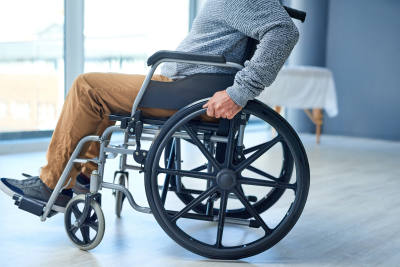Spinal Cord Injury Lawyers
Spinal cord injuries can be devastating, altering not only the life of the victim but also the lives of their families. Each year, thousands of people in the U.S. suffer traumatic spinal cord injuries, leaving them with severe physical, emotional, and financial burdens.
With decades of experience in personal injury law, our Buffalo spinal cord injury lawyers at Hiller Comerford Injury & Disability Law are dedicated to helping you seek the compensation you need to cover medical expenses, rehabilitation, lost wages, and more. We pride ourselves on offering compassionate, personalized legal services to every client, ensuring your case gets the attention it deserves.
Contact us today to schedule a free consultation and learn how we can help you through this difficult time.

Common Causes of Spinal Cord Injuries
Spinal cord injuries (SCIs) can arise from various traumatic events, each carrying unique challenges for the victims.
- Motor Vehicle Accidents: Collisions involving cars, trucks, and motorcycles are the leading cause of spinal cord injuries. The sudden impact in high-speed crashes often leads to severe trauma to the spinal cord, resulting in both temporary and permanent damage.
- Slip-and-Fall Accidents: Especially common among older adults, falls can lead to serious spinal injuries. Slipping on wet surfaces, tripping over obstacles, or falling from heights can cause fractures or dislocations of the vertebrae, compressing the spinal cord.
- Workplace Accidents: Construction sites and industrial workplaces pose significant risks for spinal injuries. Falls from scaffolding, being struck by heavy machinery, or other unsafe conditions can lead to life-altering spinal cord damage.
- Sports Injuries: High-contact sports such as football, wrestling, and diving are frequent culprits of spinal cord injuries. Accidents in recreational activities, particularly where safety precautions are not adequately followed, can result in severe injury.
- Acts of Violence: Gunshot wounds, stabbings, and other forms of physical assault can cause direct trauma to the spinal cord, leading to partial or complete paralysis. In these cases, the recovery process can be especially complex due to both the physical and emotional impacts of the violence.
Types of Spinal Cord Injuries
SCIs vary in severity and impact, depending on the location and extent of the damage. Understanding these distinctions can help guide treatment and rehabilitation plans.
- Complete vs. Incomplete Spinal Cord Injury: A complete SCI results in a total loss of motor and sensory function below the site of injury. This means that the brain’s ability to send signals past the injured area is fully disrupted. On the other hand, an incomplete SCI allows for some function below the level of injury.
- Paraplegia: Paraplegia refers to paralysis affecting the lower half of the body, including the legs and sometimes parts of the abdomen. While individuals with paraplegia may lose mobility in the lower body, they often retain full use of their arms and upper bodies.
- Quadriplegia: Quadriplegia, also known as tetraplegia, is a condition where all four limbs—both arms and legs—are affected by paralysis. This condition usually arises from damage to the cervical (neck) portion of the spinal cord.
- Secondary Complications: Spinal cord injuries can lead to a host of secondary complications that significantly impact the quality of life. These include respiratory problems (especially in quadriplegia cases), frequent urinary tract infections, pressure ulcers from limited mobility, and chronic pain due to nerve damage.
Long-Term Effects and Challenges of Spinal Cord Injuries
Spinal cord injuries have lasting physical, emotional, and financial repercussions that can significantly impact both victims and their families.
- Physical Challenges: Individuals with spinal cord injuries often face significant physical limitations, depending on the severity of their injury. Many experience limited mobility, requiring the use of assistive devices such as wheelchairs, walkers, or braces. Additionally, long-term medical care, including physical therapy, occupational therapy, and pain management, becomes an ongoing necessity.
- Emotional and Psychological Impact: Beyond the physical challenges, SCIs take a substantial toll on mental health. Many individuals struggle with depression, anxiety, and feelings of isolation as they adjust to their new reality. Psychological support, including counseling and support groups, is crucial for both the victim and their family to manage these effects.
- Financial Burden: The cost of dealing with a spinal cord injury is immense. Medical treatments, rehabilitation, and assistive technologies come with high price tags. Long-term care, including in-home assistance or specialized facilities, adds to the ongoing financial burden, making compensation for these costs essential in the legal process.
Compensation for Spinal Cord Injury Victims
Spinal cord injuries often result in overwhelming financial and emotional costs. Pursuing compensation through a legal claim can help cover these expenses and alleviate some of the burdens associated with the injury.
- Medical Expenses: Spinal cord injuries require extensive medical care, from emergency treatments and surgeries to long-term rehabilitation and ongoing medical monitoring. Compensation can help cover both immediate medical bills and future costs, including expenses for assistive devices like wheelchairs and medical equipment.
- Lost Wages and Future Earning Capacity: Many spinal cord injury victims face temporary or permanent disabilities that prevent them from returning to work. Compensation can cover lost wages during recovery, as well as the loss of future earning capacity for those unable to continue their previous employment. In some cases, victims may need to retrain for a new career, and compensation can assist with these expenses as well.
- Pain and Suffering: Beyond the financial impact, spinal cord injuries cause immense physical pain and emotional distress. Compensation for pain and suffering addresses both the ongoing physical discomfort and the psychological toll that these injuries take on victims and their families.
- Home Modifications and Long-Term Care Costs: Adjusting to life after a spinal cord injury often requires significant changes to the living environment. Home modifications such as wheelchair ramps, widened doorways, and accessible bathrooms are often necessary to ensure mobility and independence. Additionally, some victims may need in-home care or assistance with daily tasks, and compensation can cover the costs of hiring caregivers or making these adjustments.
Proving Liability in Spinal Cord Injury Cases
Whether the injury results from a car accident, slip-and-fall, or workplace incident, establishing negligence is an essential part of spinal cord injury cases. This involves demonstrating that the responsible party failed to act with reasonable care, directly leading to the victim’s injury.
For example, in a car accident, this could mean proving that the at-fault driver was speeding or distracted. In a slip-and-fall case, it might involve showing that the property owner neglected to address hazardous conditions, like a wet floor or an uneven surface.
Gathering compelling evidence is crucial to building a strong case. Accident reports, medical records, and witness testimony often form the foundation of a liability claim.
Additionally, expert opinions from medical professionals or accident reconstruction specialists can help clarify the severity of the injury and the circumstances that led to it.
Our Buffalo Spinal Cord Injury Lawyers Can Help
Choosing the right attorney after a spinal cord injury can make all the difference in securing the compensation you deserve. At Hiller Comerford Injury & Disability Law, our Buffalo spinal cord injury lawyers bring decades of experience to the table, successfully representing clients in some of the most challenging and complex personal injury cases.
Our firm has a proven track record of helping spinal cord injury victims recover compensation for medical expenses, lost wages, and the emotional toll these injuries impose. We take pride in our ability to navigate the intricacies of each case, ensuring that every legal strategy is tailored to meet the unique needs of our clients.
What sets us apart is the personalized attention we offer to every client. At Hiller Comerford Injury & Disability Law, we believe that no two spinal cord injury cases are alike, and our dedicated team takes the time to understand your situation in detail. We work tirelessly to maximize compensation, not just for the immediate impact of the injury, but for the long-term care, rehabilitation, and life adjustments you may require. From the initial consultation to the resolution of your case, we’re with you every step of the way, offering compassionate, expert guidance.
Contact our Buffalo spinal cord injury lawyers today.
